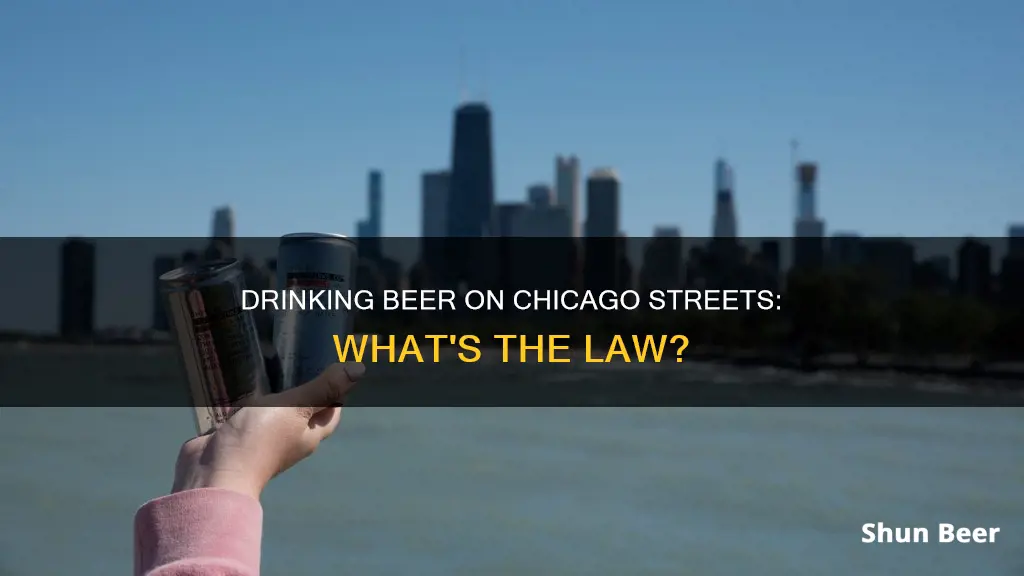
Drinking in public is illegal in Chicago, and this includes drinking beer on the street. Chicago statute 8-4-030 states that it is unlawful for any person to drink alcohol on any public way or in a motor vehicle upon a public way in the city. Public ways include sidewalks, roads, streets, and alleys. However, there are some exceptions to this rule, such as for sidewalk cafes with the proper licenses to sell liquor and certain areas of Navy Pier and the Riverwalk. Drinking in public can result in fines ranging from $100 to $500, or even jail time. Despite the law, some people in Chicago choose to drink discreetly in public places, and law enforcement may turn a blind eye unless it leads to other incidents or disturbances.
| Characteristics | Values |
|---|---|
| Legality | Drinking in public is illegal in Chicago. |
| Exceptions | Drinking is allowed in certain licensed venues, such as sidewalk cafes, Navy Pier, and Riverwalk. |
| Containers | Drinking from open containers in public is illegal. |
| Vehicles | Drinking in or around motor vehicles on public ways is prohibited. |
| Fines | Fines for drinking in public range from $100 to $500, with higher fines for areas near parade routes. |
| Enforcement | Enforcement may vary, and minor offenses are often overlooked. |
What You'll Learn

Drinking in public is illegal in Chicago
The law also prohibits carrying an open container of alcohol in public, including on public transport. This offence can be committed even if the alcoholic contents are not being consumed. The only exception to this rule is if the alcohol is in an approved container that clearly identifies the name of the serving establishment and is purchased at an establishment holding a valid liquor license.
The legislation regarding alcohol consumption and carrying in public is covered under various Illinois statutes. According to 625 ILCS 5/11-502, a driver is not allowed to carry, transport, possess or have any alcoholic liquor within the motor vehicle except in the original container with an unbroken seal. 235 ILCS 5/6-33 states that a licensed restaurant may permit a patron to remove one bottle of partially consumed alcohol from the premises, but it must be securely sealed and placed in a bag.
Violation of the public drinking and carrying laws can result in a fine of $100 to $500, or up to six months in prison. The fine may increase to $1,000 if the incident occurs within 800 feet of a parade route. These punishments are usually brought together with related offences, such as causing a disturbance to peace and order, resisting an officer, driving under influence, attempted assault, or drug possession.
While law enforcement may turn a blind eye to minor violations, it is important to note that even a minor conviction can lead to a criminal record. Minors and teenagers caught with alcohol are more likely to be arrested, and drinking and driving is strictly prohibited and punishable by law.
The Magic of Beer Guns: Filling and Foaming Perfection
You may want to see also

Drinking on the street can lead to a fine or imprisonment
Drinking in public is illegal in Chicago. Chicago statute 8-4-030 states that it is unlawful for any person to drink alcohol on any public way, which includes sidewalks, roads, streets, alleys, or any similar public routes used by cars or pedestrians. It is also illegal to drink in or around a motor vehicle on a public way.
The law also prohibits carrying open containers of alcohol in public spaces, including public transport. This means that even if you are not drinking, simply carrying an open container of alcohol is an offence. The only exception to this is if you are leaving a licensed restaurant with a partially consumed bottle of alcohol, which must be securely sealed by the licensee and placed in a bag.
The penalties for drinking in public include fines of between $100 and $500, or imprisonment for up to six months, or both. If the offence occurs within 800 feet of a parade route, the fine may be increased to between $500 and $1,000.
While law enforcement may turn a blind eye to minor offences, drinking in public can still result in a criminal record, particularly for minors and repeat offenders. It is important to be aware of the laws and regulations regarding alcohol consumption and to drink responsibly to avoid any legal consequences.
Bottoms Up Beer Dispensers: How Do They Work?
You may want to see also

Drinking in public parks is also prohibited
Drinking in public is prohibited in Chicago, Illinois. This includes drinking on a public way or in a motor vehicle upon a public way. Chicago statute 8-4-030 states that it is unlawful for any person to drink alcoholic liquor in public. Drinking in public is considered an affront to civilised behaviour and socially irresponsible.
The Chicago Park District's official BYOB policy is unclear. While the Municipal Code prohibits bringing alcohol into any public park, playground, or beach, and drinking alcohol on the public way, some people report that the police often look the other way. However, there are reports of people being fined for drinking in public parks and beaches.
Drinking in public parks is prohibited, and it is illegal to bring alcohol into any public park, playground, or beach. However, there are exceptions for certain areas, such as sidewalk cafes with the proper permits, and designated areas near beachside bars or restaurants. Additionally, the Cook County Forest Preserve allows alcohol in its facilities and parks as long as individuals are over 21 and not drinking within 50 feet of a road, parking area, or entrance.
It is important to note that the Chicago Park District parks, which include city beaches, allow alcoholic beverages with a "picnic permit" or within designated areas. Millennium Park also allows alcohol during events and for a period after, as long as guests remain orderly and respectful.
While drinking in public parks is prohibited, the level of enforcement may vary, and some people choose to drink discreetly in parks and beaches. However, it is essential to be aware of the legal risks and potential fines associated with drinking in public spaces.
Morning Beer: Should You Drink Before Work?
You may want to see also

Drinking in public is considered socially irresponsible
There are several reasons why drinking in public is considered socially irresponsible. Firstly, it is associated with criminal behaviour such as assaults, property damage, disorderly or offensive behaviour, and drink driving. Opponents of drinking in public argue that it encourages overconsumption of alcohol, rowdiness, and violence. They suggest that alcohol consumption should be limited to private establishments such as bars or clubs, where staff can monitor consumption and where any rowdiness can be better controlled. Drinking in public also increases the risk of public inebriation, which can lead to aggressive behaviour and broken glass bottles on the street, which can cause harm to people and wildlife.
In addition, drinking in public can have negative impacts on individuals' health and well-being. Alcohol affects people's decision-making abilities and can lead to health issues such as digestive disorders, dietary deficiencies, concentration and memory problems, sleeping difficulties, mental health conditions, and increased risk of certain cancers. Drinking in public also normalises alcohol consumption and can contribute to the development of unhealthy drinking cultures.
While some countries and cities have more relaxed attitudes towards drinking in public, it is important to consider the potential negative consequences and take a responsible approach to alcohol consumption.
Is Beer Safe During Pregnancy?
You may want to see also

Drinking in public may lead to other incidents, such as public urination
Drinking alcohol in public is an offence in Chicago. Chicago statute 8-4-030 prohibits drinking alcohol on public ways, which include sidewalks, roads, streets, alleys, or any similar public routes used by pedestrians or vehicles. The same statute also prohibits carrying open containers of alcohol in vehicles on public ways, unless the container is sealed.
Public drinking is considered an offence because it can lead to other incidents, such as public urination. Public urination is illegal and can result in a criminal conviction. While public urination might not be listed as a crime in some states, it is usually prohibited by state laws or local ordinances. In Chicago, public urination can be charged as disorderly conduct or creating a public nuisance, and can result in fines, community service, or even jail time.
The consequences of public drinking and urination can be serious, and individuals may face legal and financial penalties, as well as creating a criminal record. In addition, public drinking can lead to other charges such as causing a disturbance, resisting an officer, or driving under the influence. It is important for individuals to be aware of the laws and the potential consequences of their actions to avoid legal troubles and penalties.
While some people may not view public drinking and urination as serious issues, they can have negative impacts on the community and lead to other incidents. It is important to be mindful of the laws and act responsibly to avoid any unwanted consequences.
Beer After Work: Why Do I Always Crave It?
You may want to see also
Frequently asked questions
No, it is not legal to drink a beer on the street in Chicago. Chicago statute 8-4-030 states that it is unlawful for any person to drink any alcoholic liquor on any public way in the city.
Individuals can face fines between $100 and $500, or time in jail for drinking in public. This fine may go up to $1,000 if the incident occurs within 800 feet of a parade route.
No, it is also illegal to drink a beer in your car in Chicago. The same Chicago statute 8-4-030 states that it is unlawful for any person to drink any alcoholic liquor in or about any motor vehicle upon a public way in the city.







